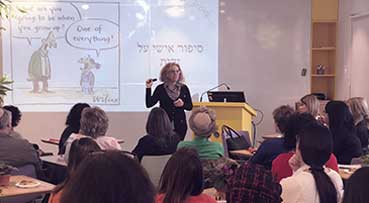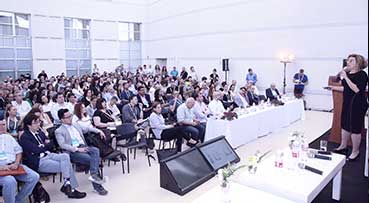Building trust is not easy. It is developed over time by way of communicating and working together thus allowing colleagues to get familiarized, which leads to stable relationships being established. The pandemic limitations challenged our abilities to build relationships with the traditional approach. Gone are the times when we could easily meet each other face to face and take the time to learn about each other’s characters, values and personal qualities in real time.
This challenge is especially acute among those who have managers, teams, clients or investors abroad. In the past, flying to meet face to face and connect was more of a common occurrence. Nowadays, we often end up being viewed by our business partners as just another voice heard on a conference call or that teammate who always interrupts the conversation from a screen while everyone else is around a common table. Which is frustrating, because these are the only ways we can cope with the challenges of physical distance in the digital world.
In the post-pandemic era we have whole new questions to ask: how and when should is there value in physical travel? Are there other ways that can help us close the gaps of physical distance, build deep relationships with others, and maintain our impact and success?
How Do You Build Trust From a Distance?
Be Professional
It all starts with convincing the other party that you have the ability and the knowledge to get things done. Being perceived as highly professional enables people to rely on you and on your word even when you’re far away. It’s important to understand that saying you can is not enough. You need to prove that you can get things done: come prepared for meetings, familiarize yourself with the details and with the big picture, know how to answer questions and show engagement. This requires you to only promise what you can deliver and to not be afraid to explain what cannot be done or why you disagree. Remember trust is most compromised by surprises such as not following through on promises, missing deadlines, lack of availability, or mismatch in expectations.
Physical distance impacts information transfer – it gets more difficult to stay abreast of all the details you might need to know in real time. Therefore, it’s important to ask questions and ensure clarity. Make sure that you fully understand how success is defined and who defines it. Then, make sure to stay in sync with your stakeholders to avoid any gaps in expectations.
Communicate and be Transparent
Frequent and clear communication will help minimize misunderstandings. When you rely on someone and know that the person will inform you if something goes awry, you don’t feel the need to get an update every few hours. On the other hand, if you experience that an employee or another business partner might surprise you, you will feel the need to micromanage. Consequently, they will feel the lack of trust and the whole relationship will deteriorate. Being trustworthy in any situation is always a winning strategy.
The problem is that even when we want to be trustworthy, sometimes life has its own plans. The unexpected happens and timelines move or focus changes; sometimes we are not aligned with the other party, do not understand their requirements, or rely on others to deliver on our promise. Sometimes it can even be the organizational politics that can impact the way you are treated, regardless of your work ethic and intent. Therefore, the more transparent you are regarding your motivation, your values, and your decision-making processes – the more others will trust you and your intent, and feel more comfortable with your actions, even if they do not see the full picture.
Mind Cultural Differences
Even when we’re not aware of it, there are basic principles of conduct that solidify our relationships by creating common ground. When you tell your manager in Israel that “everything is under control”, he or she understands the definition of “under control” and knows what to expect. This mutual understanding is lacking when you and your boss live and work in different cultures. In Israel, for example, when we commit to a timeline, we know that this timeline may be flexible within a certain timeframe – say, plus minus a week. However, if the other party is from Germany or the USA, they will probably expect to receive your deliverables on that specific day, early in the morning or by the end of the business day at the latest.
Sometimes trust is undermined by such cultural differences. It can even be worse if your manager has no cultural awareness as he or she may perceive the misunderstanding as disrespect or poor performance. In such cases, it can be helpful to use a “cultural interpreter” to help you understand context. And remember: an open conversation always helps, too.
Be Generous
Precisely because of the distance you need to give more than you receive to create the trust and connections. Assume that there are things that you don’t know that you don’t know as well as potential misunderstandings or misinterpretations from either side. So, it is very important that you increase the flow of information – both for your ability to do your work effectively, as well as for career growth.
At first glance, not an easy task. Too often people keep both the information and the credit to themselves when what you really need to do is just the opposite: share, share, share! Map your network and locate the people who have similar values and interests at work to yours. Then make sure to stay connected, share everything you know that can be helpful to them. You will be surprised to see that they will share with you information that you wouldn’t have been able to receive otherwise. This includes sharing credit. Evaluate everyone involved in and impacted by the work you are doing and engage them too. Gather feedback, keep them posted, and include their names in your materials as co-creators, teammates, contributors – you name it. You will be surprised to discover that next time your assignments will get done much easier and faster.
Generosity can also be expressed in the ways we behave. Avoid rolling your eyes in a meeting when someone says something that you do not necessarily agree with and stay away from gossiping. If someone struggles – offer help or be there to listen to them. At the end of the day, people remember how you made them feel. You want this to be a positive experience.
Authenticity Begets Trust
Everyone struggles sometimes, and sometimes things go really off course. When someone asks you “how are you” and you always say “great”, you do not contribute to building trust. Be open to discuss your own challenges and hardships as much as your wins and successes, ask for help and solicit the opinions of others. This will help others connect with you at a human level, and not only at a professional level. Don’t be afraid: vulnerability and empathy are part of the workplace in this new era. You do not have to have all the answers. In fact many times you are much better off bringing the right people to the table to create the solution versus being the smartest person in the room. Furthermore, when you are far away from other teammates, it also enables you to have someone in your corner supporting you, especially in situations where you aren’t present and can’t speak for yourself.
This approach works also beyond the actual work itself. You are building relationships. You don’t always have to dive into a work conversation at the start of every meeting. Imagine you were meeting your partners in their office across the sea – what would that initial interaction look like? Probably, you would have a chat during lunch about some world event or favorite sport. It is worth trying to keep this same dynamic while working distantly: take a few moments to talk about topics other than work – something that both sides feel comfortable with. It can be hobbies or international current affairs – just the way you would do with your teammates locally or at a conference coffee break. Here, you also need to be attentive to details: if someone shares something about their personal lives at the beginning of the meeting, it is a good signal for you that it is acceptable to share something personal yourself.
When your remote colleagues feel that they understand what kind of person you are, trust you, and know what they can expect from you, the distance is no longer a barrier. Communication flows, relationships flourish, and you have all the tools to close the mileage gap – just like that good old friend who you haven’t seen for ages, but when you do, you can pick up the conversation right where you left off without missing a step. Until the next meeting.

![large-AX1A2125-2[1] large-AX1A2125-2[1]](https://niritcohen.com/wp-content/uploads/elementor/thumbs/large-AX1A2125-21-pnzedcs72atx5aeurqytqdiihxixlq02re9mlz805s.jpg)






